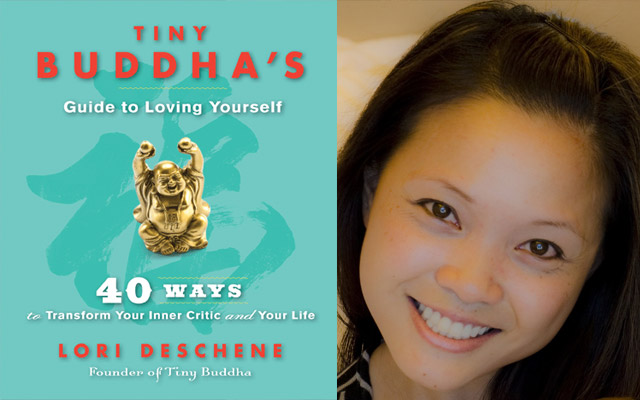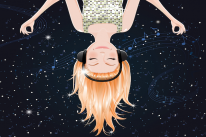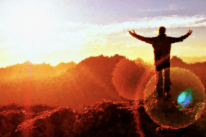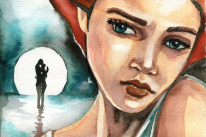
This month we’re celebrating the upcoming launch of Tiny Buddha’s Guide to Loving Yourself, a book about taming your inner critic that features 40 stories from Tiny Buddha contributors.
Throughout September, you’ll have a chance to meet some of them through daily interviews here on the blog.
Today’s featured contributor is Cat Li Stevenson, an avid meditator, a blogger for Think Simple Now, and a Sponsorship Coordinator for the Wisdom 2.0 Conference.
In her contribution for the book, she explores what it really means to take care of ourselves—not just physically, but mentally, emotionally, and spiritually.
A little more about Cat…
1. Tell us a little about yourself and your self-love journey.
I’ve been in a major shift since June 2012. Well, the inner journey began years before that, but since last year I’ve been making external life changes—like quitting my corporate job, giving away most of my material goods, moving to SF to live in an urban Zen practice center, and working on inspiring events with Wisdom 2.0.
My self-love (aka soul-searching, self-compassion) journey has included a massive simplifying and stripping down to see the wholeness that’s been buried. I spent the past decade consumed with busyness in chasing things outside of myself—exerting (an exhausting and unsustainable) effort to keep up with things that I thought would make me happy.
That guiding force has been a desire to live in a way that would fit into an externally recognized, achievement-based life.
I’m unlearning and re-learning what it means to live from an organic, more fulfilling, human place—how to be where I am, pay attention to what authentic happiness means for me—and ultimately take care of this “one wild and precious life.”
2. Have you ever felt there’s “something wrong with you”? If so, why, and what’s helped you change your perception?
Umm, yea. I think these roots began growing up in a mostly Caucasian neighborhood, and being a Chinese American. As the first generation living in the states, I felt like I straddled two worlds—that of being Chinese, that of being American—and I didn’t really find a place where I fit in (within some pre-conceived box I’d created and labeled as “belonging” on either side).
This thinking pattern still finds its way into my adulthood. Like, today I was at a meeting and didn’t feel warmth from one of the people in the room. And this ignited a familiar, perpetual story of not being good enough at what I was doing, and a sense of not belonging.
When I’m aware of these feelings, I try to give my inner realm some space instead of fighting with my own emotions and adding more tension to what’s already there—giving spaciousness to be curious and notice what’s happening mentally, emotionally, and in my body.
I stay right there with that feeling, and drop the mental chatter, usually a habitual story of self-judgment. I identify with where that feeling is in my body, and remember that feeling isn’t actually me. It’s a momentary feeling that comes, and then diminishes.
Though it seems counterintuitive, actually leaning into the feelings of not belonging has helped me move through it.
3. Have you ever thought something was a flaw only to realize that other people actually appreciate that about you? What was the “flaw”?
I’ve always been into many things that don’t usually co-exist together. I love hip-hop and electronica, and also classical and kirtan. I enjoy bowing, chanting, praying—and have also been into Sex In The City lately.
It used to frustrate me that I couldn’t fit into this one “either/or” box of some sort, and that felt like a flaw. Now, I’m noticing that this dynamic range—this idea of “and”—is okay. Having a love of various things has also gifted me opportunities to connect and harmonize with all sorts of interesting people.
4. What was your biggest mistake (that you’re willing to share), and what helped you forgive yourself?
My biggest mistake, I don’t know if I’d phrase it as that. But perhaps my biggest lesson is what I share in my post for the book—that of being so caught up in busyness and “pushing” through my life, not listening to my body or attuning to my intuition.
What’s allowed me to forgive myself is knowing that this remarkable journey I’m on now likely wouldn’t have happened if I hadn’t experienced that stage in my life.
5. Complete this sentence: When other people don’t like me, I…
…try to practice with Don Miguel’s words.
The habitual reaction when I sense someone doesn’t like me or “get me” is to fall into that same lengthy story of self-judgment. The work comes in remembering his advice from the Four Agreements: “Don’t take anything personally. Nothing others do is because of you. What others say or do is a projection of their own reality.”
6. What are some areas in your life where you’ve compared yourself to other people, and what’s helped you let go of these comparisons?
I find it easy to get caught up in thinking everyone else’s life is less challenging than mine. Especially with social media when we get to pick and choose what we display to the world, most of us choose to share that which is only on the surface. And that can both be beautiful and can create an illusion.
I compare myself to people who might be living an outward life that appears to be flawless. You know, the perfect body, the perfect vacation, the perfect partner, the perfect job, the perfect family—the perfect everything (from my limited perspective)!
When my comparing mind kicks in, I remember to practice gratitude for my life. I also remember that none of us are exempt from this full range of human experience. None of us are immune to hardship and challenges, no matter how perfectly crafted a life may appear. And we’re really not so different, regardless of what we may “think.”
7. What’s one thing you would tell your younger self about looking to other people to complete you?
This entire journey we’re on is really an inside job. This statement is so redundant that I likely would have rolled my eyes at anyone who tried to give me this advice when I was younger!
Though, I’m noticing, it’s really true.
The quickest way to unhappiness is looking outside of ourselves. It’s like traveling with a blindfold on with no idea of where we’re headed and why, then getting directions from other people.
This parallels other pursuits, like finding a partner that you think will make you happy or going after a goal for recognition, or wanting a car that you may feel prestigious in, or an outfit that makes you feel good.
These things are all fine to want, to have—though, in my experience, no matter how much abundance and happiness we think may exist outside of ourselves, if we are not attuned to the inside we’ll always return to a baseline of dissatisfaction. I know this experience of feeling restlessness and being insatiable firsthand.
The moment I began the (both challenging and liberating) work on myself through meditation, yoga, contemplation, and community support of good friends and teachers, I began to feel more complete within.
8. Have you ever felt afraid to show people your “real” self? Why—and what’s helped you move beyond that?
When I’m afraid to show my real self, it’s usually because there’s an inner judge that is telling me how I should be. Inner Judging Cat says that I’d be more lovable if I were smarter, fitter, kinder, and a more patient friend and partner—and that my worth is earned, hinging on some level of self-improvement.
I think the world of constant improvement and productivity can be so pervasive that this moment and who we are now doesn’t seem like enough.
It reminds me of what a friend once said: “My practice is just to keep coming back to myself. To not fixate on who I want to be so much that I miss out on who I already am.”
I have a strong hunch that self-acceptance may be a large part of the self-love journey.
9. What are the top three things you personally need to do to take good care of yourself, mentally and emotionally?
- Sleep
- Meditation
- Being active/outdoors with friends
10. What’s something you do regularly that makes you feel proud of the difference you’re making in the world?
Taking the time to work on myself and grow with a daily meditation practice with a community of practitioners.
I think that transformation in the world begins with each individual. And the more each of us pay attention in our own lives, the more we will begin to show up wholeheartedly in other areas of life—from the interaction at the local café or grocery store to our job, family, friends, and then rippling into the larger community.
I feel like that this work on self, returning to a place of wholeness and self-compassion, is the greatest difference each of us can make. Like what Gandhi said, “Be the change you wish to see in the world.”
*Note: I edited this post to remove info about the pre-order promotion, which ended on October 8, 2013. You can learn more about Tiny Buddha’s Guide to Loving Yourself here.
About Lori Deschene
Lori Deschene is the founder of Tiny Buddha. She started the site after struggling with depression, bulimia, c-PTSD, and toxic shame so she could recycle her former pain into something useful and inspire others to do the same. You can find her books, including Tiny Buddha’s Gratitude Journal and Tiny Buddha’s Worry Journal, here and learn more about her eCourse, Recreate Your Life Story, if you’re ready to transform your life and become the person you want to be.
- Web |
- More Posts













 Though I run this site, it is not mine. It's ours. It's not about me. It's about us. Your stories and your wisdom are just as meaningful as mine.
Though I run this site, it is not mine. It's ours. It's not about me. It's about us. Your stories and your wisdom are just as meaningful as mine.
I love reading the contributors experience Lori!
Thank you for putting these posts together for us!
Cat – your experience of living in 2 worlds definitely resonates as well as many of your other discoveries and life lessons. We tend to seek so much externally, we often forget about what really matters within. And interestingly enough, the material/external world tends to reward us for all the things that don’t matter. Externally we are told to look better, travel more, earn more, move up, expand, increase….when really all we need to do is be. Be our essence. Be our real self. Be one with our intuition.
Thank you for this open, honest and insightful account. Lori, so looking forward to reading the TB Guide to Loving Yourself.
“This entire journey we’re on is really an inside job.” I’m beginning to realize and understand this. Now I have to figure out how to embrace this. Wonderful post. Thanks!